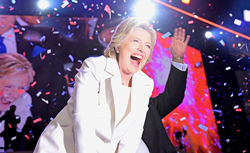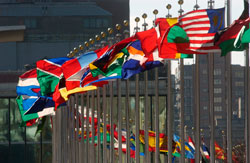Donna Brazile, former Democratic National Committee (DNC) Chairwoman, ignited controversy after releasing an excerpt from her upcoming book, Hacks. In the excerpt, published by Politico on Nov. 2, Brazile says she found a fundraising contract between the DNC and Secretary Hillary Clinton’s campaign, insinuating the primaries had been rigged against Bernie Sanders.
“If the fight had been fair, one campaign would not have control of the party,” Brazile writes in the excerpt. However, when confronted about her accusations in an interview with George Stephanopoulos on Nov. 5, Brazile said that she “found no evidence, none whatsoever” that the primaries had been rigged.
Brazile explains that, under her predecessor, Debbie Wasserman Schultz, the DNC agreed to form a shared fundraising committee with the Clinton Campaign in August 2015. She writes that after Obama’s negligence of funding the Committee—focusing instead on his own group, Organizing for America—he left the Democratic party “in significant debt.”
The morning after the Democratic National Convention, Gary Gensler, the Chief Financial Officer of Clinton’s 2016 campaign, told Brazile that the DNC was “broke” and two-million dollars in debt, leaving Clinton with the tab. Gensler explains that after Obama’s campaign, he left the Democratic Party $24 million in debt—with “$15 million in bank debt and more than eight-million dollars owed to vendors,” Brazile writes.
Clinton vowed she would build the party “from the ground up…When our state parties are strong, we win,” Clinton said, according to a Politico report last May, “That’s what will happen.”
Consequently, the agreement between the DNC and the Clinton campaign was aimed at reconstructing the party’s devastated finances by simultaneously fundraising for Clinton’s campaign, the National Committee, and the individual state party organizations, the Washington Post reports.
The Clinton campaign had also signed an additional “memorandum of understanding,” according to NBC’s Alex Seitz-Wald. The memorandum outlined that Clinton would have access to budgeting, data, analytics, and communications. In addition, Clinton would also have a say in staffing; for example, according to The Philadelphia Inquirer, if there were a vacancy in the DNC’s staff, Clinton would be consulted of the three finalists in consideration, but the DNC would ultimately make the final decision itself.
Brazile refers to this agreement, in her excerpt, as “Hillary’s secret takeover of the DNC.” However, the agreement related only to info pertaining to the general election, not to the primary election. Furthermore, it did not grant Clinton such authority until after she secured the nomination, if she did at all, which is common for candidates to do. Even Brazile, herself, writes, “When the party chooses the nominee, the custom is that the candidate’s team starts to exercise more control over the party.”
Moreover, the Sanders campaign was also offered joint-fundraising agreements. According to the Washington Post, Perkins Coie, a law firm representing the DNC, emailed the Sanders campaign in September 2015 with a copy of a “standard joint fundraising agreement.”
“This is the same one we have used with other campaigns,” Graham Wilson, Esq., wrote in the email. “Wilson suggested that should the Sanders campaign raise ‘significantly more’ money than was required to pay for the party voter file, then Sanders could have a say in how those funds would be used ‘to prepare for the general election,’” the Washington Post reports with the obtained email.
“The DNC has had discussions like this with the Clinton campaign and is of course willing to do so with all committees raising funds for the [DNC],” Wilson wrote in his email.
However, Sanders and his staff dismissed these joint fundraising deals because “they had their own way of raising money through small donations,” Brazile writes. Instead, Sanders focused on fundraising from “organizations such as Justice Democrats, Political Revolution, and the Democratic Socialists of America,” Roxy Nicoletti, a sophomore biochemistry student and Sanders supporter, explained. “[They] are paving the way for candidates who will fight for causes like [single-payer] healthcare…,” she said.
Tom Perez, the current DNC Chairman, also points out that primaries are run by states and individual voters—not by the DNC. Furthermore, in a segment on “Meet the Press,” he said of the DNC, “We run caucuses, [not primaries,] and Bernie Sanders did very well in the caucuses.”
“‘Rigged’ is the wrong word,” Christopher DeRosa, Ph.D., an associate professor of history and the Director of the History Program, said. “Parties’ national committees normally back who they think has the best chance of winning [and it] isn’t the DNC’s obligation to bend over backwards for a candidate who has been loudly and proudly not a Democrat, and there is no reason to think that Clinton’s nomination reflected anything other than the will of the party’s majority.”
Indeed, four-million more voters simply preferred Clinton’s pragmatism over Bernie’s proposals in the Democratic primaries.
Clinton, herself, has recently responded to Brazile’s accusations: “I didn’t know what she was referring to because, as has now come out, that just wasn’t the case,” she said during an appearance on “Late Night with Seth Meyers” last week.
IMAGE TAKEN from ABC News


